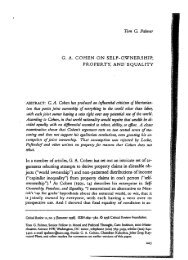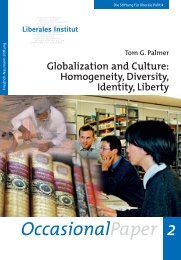Are Patents and Copyrights Morally Justified? - Tom G. Palmer
Are Patents and Copyrights Morally Justified? - Tom G. Palmer
Are Patents and Copyrights Morally Justified? - Tom G. Palmer
You also want an ePaper? Increase the reach of your titles
YUMPU automatically turns print PDFs into web optimized ePapers that Google loves.
Ilarvarajournat of Law C~tuotw rotwy L.voL. io<br />
ments ofpersonal development—seems in some ways arestatement<br />
of Locke’s basic argument, 74 but with a different twist.<br />
Rather than emphasize the satisfaction of man’s material wants<br />
<strong>and</strong>, through that, fulfillment of God’s injunction to man in the<br />
Garden of Eden to prosper <strong>and</strong> multiply, von Humboldt emphasizes<br />
the development of human potential. 75 The key to<br />
both the Lockean <strong>and</strong> the Humboltean arguments is ownership<br />
in ourselves, with state power severely constrained <strong>and</strong> limited<br />
to the protection of liberty. As J.W. Burrow notes, “[Humboldt’s]<br />
view of the State’s functions may not differ in practice<br />
from a natural rights theory ofthe traditional Lockean kind.” 76<br />
In practice, the Lockean <strong>and</strong> von Humboldtean liberty-based<br />
arguments for property are fundamentally the same, although<br />
the emphasis differs. At base, each is intimately concerned with<br />
freedom. Indeed, von Humboldt’s argument against the validity<br />
of testamentary dispositions that go beyond mere transference<br />
of property titles to one’s heirs shows the primacy of<br />
freedom in his theory:<br />
[A]s long as he lives, man is free to dispose of his things as<br />
he pleases, to alienate them in part or altogether—theirsubstance,<br />
use, or possession; . . . But he is in no way entitled to<br />
define, in any way binding on others, what shall be done with<br />
his property after his decease, or to determine howits future<br />
possessor is to act. . . . [This] restricts that freedom which is<br />
essential to human development, <strong>and</strong> so runs counter to<br />
every principle we have put forward. 77<br />
This argument from personality offers little support for patents<br />
<strong>and</strong> copyrights, <strong>and</strong>, like other arguments from ownership<br />
rights in ourselves, would be more likely to undercut claims for<br />
intellectual property rights.<br />
74. See supra notes 53-67 <strong>and</strong> accompanying text.<br />
75. As the English Leveller leaderRichard Overton similarly argued,<br />
ToeveryIndividual] in nature, is given an individuall property by nature, not<br />
to be invaded or usurped by any: for every one as he is himselfe, so he hath a<br />
selfe propriety, else could he not be himselfe, <strong>and</strong> on this no second maypresume<br />
to deprive any of, without manifest violation <strong>and</strong> affront to the very principlesofnature,<br />
<strong>and</strong>ofthe Rules ofequity <strong>and</strong>justice betweenman <strong>and</strong> man;<br />
mine <strong>and</strong> thine cannot be, except this be: No man hath power overmy rights<br />
<strong>and</strong> liberties, <strong>and</strong> I over no mans; I may be but an Individuall, enjoy my selfe<br />
<strong>and</strong> my selfe propriety, <strong>and</strong> may write my selfe no more then my selfe, or<br />
presume any further. .<br />
Overtop, An ArrowAgainst All 1)ranb, ~flTHE LEVELLERS IN THE ENGLISH REvourrIoN<br />
68 (G.E. Aylmer ed. 1975).<br />
76. Burrow, Editor’s Introduction to W. VON HUMBOLDT, su,bra note 69. at xxxix.<br />
77. W. VON HUMBOLDT, supra note 69, at 96.97.











